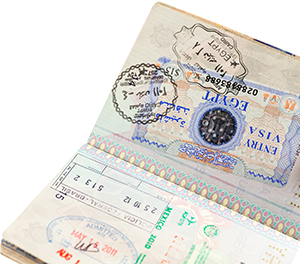Passport vs Travel Visa: What is the Difference?
Updated As of read 4 min

In most cases, traveling to a new country is an exciting experience that presents adventures and life-changing opportunities. Some of the reasons why people move to foreign countries are tourism, to pursue studies and careers, and to do business.
If you are conversant with the process of traveling to a foreign country, you know that travel documents are necessary. Many people are familiar with the terms passport and visa since they go hand in hand in most cases. However, some do not know the difference.
These travel documents are vital, and they serve different purposes. You can better understand these official papers once you know the use of each. This article will demystify the mix-up between passport vs. travel visa for you.
What is a Passport?
A passport is an official document you receive from your country’s government to serve as proof of identity and citizenship. The document helps to identify you when you are in a foreign country. It bears your personal information and a photograph and has several blank pages.
Countries across the globe are adopting electronic security measures, including adding biometric data to a chip embedded on the passport. The development is an attempt to curb forgery. Passports come with a validity period, after which you have to renew.
A passport also allows its holder to return to the issuing country. This privilege may extend to foreigners with the right of abode in the country. However, the document does not automatically grant you any rights in the state you are visiting.
Validity of Passports
Passports belong to the state under the law of most countries. The government can revoke it on specified grounds at any time. The rules surrounding passports may have slight variations in different countries.
Most countries issue their citizens with only one passport at a time. Nationals can apply for replacements when the old ones expire or have no blank pages. In such a case, the issuing authority may demand the surrender of the old document for invalidation.
Some countries could allow you to have more than one passport under special conditions. For instance, if you are always traveling for business. You could get another passport to use while the first one awaits a visa for somewhere else, but you must prove the need.
Sometimes you will not need to surrender the expired passport. An example of such a case is when the passport contains a valid visa. In most countries, the validity of passports is five or ten years.
What is a Travel Visa?
A travel visa is an official document you receive from the government of the country you visit. It serves as a permit for you to be in the country. A visa is in the form of a stamp or a sticker attached on a blank page in the passport.
Sometimes the need for a visa depends on your citizenship, the purpose of your visit, and the planned duration of your stay.
In the past, immigration officers had the power to allow or reject the entry of visitors into a country. It is after granting the visitor entry that they would stamp the passport. Nowadays, most states require you to apply for a visa in advance.
You obtain a travel visa from the embassy of the country you are visiting or its local consulates. A visit in this context is the reason for entry into a foreign country. Some countries allow visitors to acquire visas on arrival for brief visits.
Typical information captured in a travel visa is the duration of your stay, the day you may enter, and the territory you may access in the country. The visa may also state whether you have permission to work in the country you are visiting.
A travel visa is subject to checks by immigration officials at the point of entry. The country’s government you are visiting can revoke your visa at any time.
In rare occasions, some states provide mandatory exit visas. Whether citizen or noncitizen, you have to apply for this document before leaving the country. Conversely, some countries have bilateral agreements to allow their citizens to visit or leave without visas.
In the event the country you wish to visit does not have an embassy or a consulate, you may have to look for visa application services in another country. Otherwise, the host country can process your visa and arrange for you to collect it at the entry port.
Categories of Travel Visas
Various countries have different types of visas. Below are some of the universal classes.
Immigrant Visas
People who qualify for this visa can move to the issuing country and acquire permanent residence. Examples include marriage visas and spouse visas.
Visitor Visa
This type of visa permits you into a country for a specified purpose within a limited period. Examples include tourist visas, private visas (when invited), visas for medical reasons, business visas, and refugee visas.
Related Read: How to Get a Chinese Visa?
Long-Stay Visa
This visa permits its holder to stay in the country for an extended but limited period. Examples are temporary worker visas, student visas, asylum visas, and journalist visas.
Transit Visa
This type of visa allows you to pass through a country to a destination in another country. The duration for the visit could be anything from a few hours to some days.
An excellent example of a transit visa is the driver, steward, or crew member visa. The issued person is usually an employee of an aircraft, sea vessel, train, or another locomotive traversing the issuing country.
Official Visas
These are visas for people working for their governments in foreign countries. They include diplomatic visas and courtesy visas.
Conclusion
We hope the distinction between a passport and a travel visa is clear. The main difference is the issuing authority. You get a passport from the immigration department of your country, whereas you obtain a visa from the country you want to visit.
However, countries have different laws governing international visits. Some states require both documents, whereas others accept the passport only. Others allow the movement of visitors from specified nations with neither a passport nor a visa.
If you have any passport questions, be sure to ask the pros.



